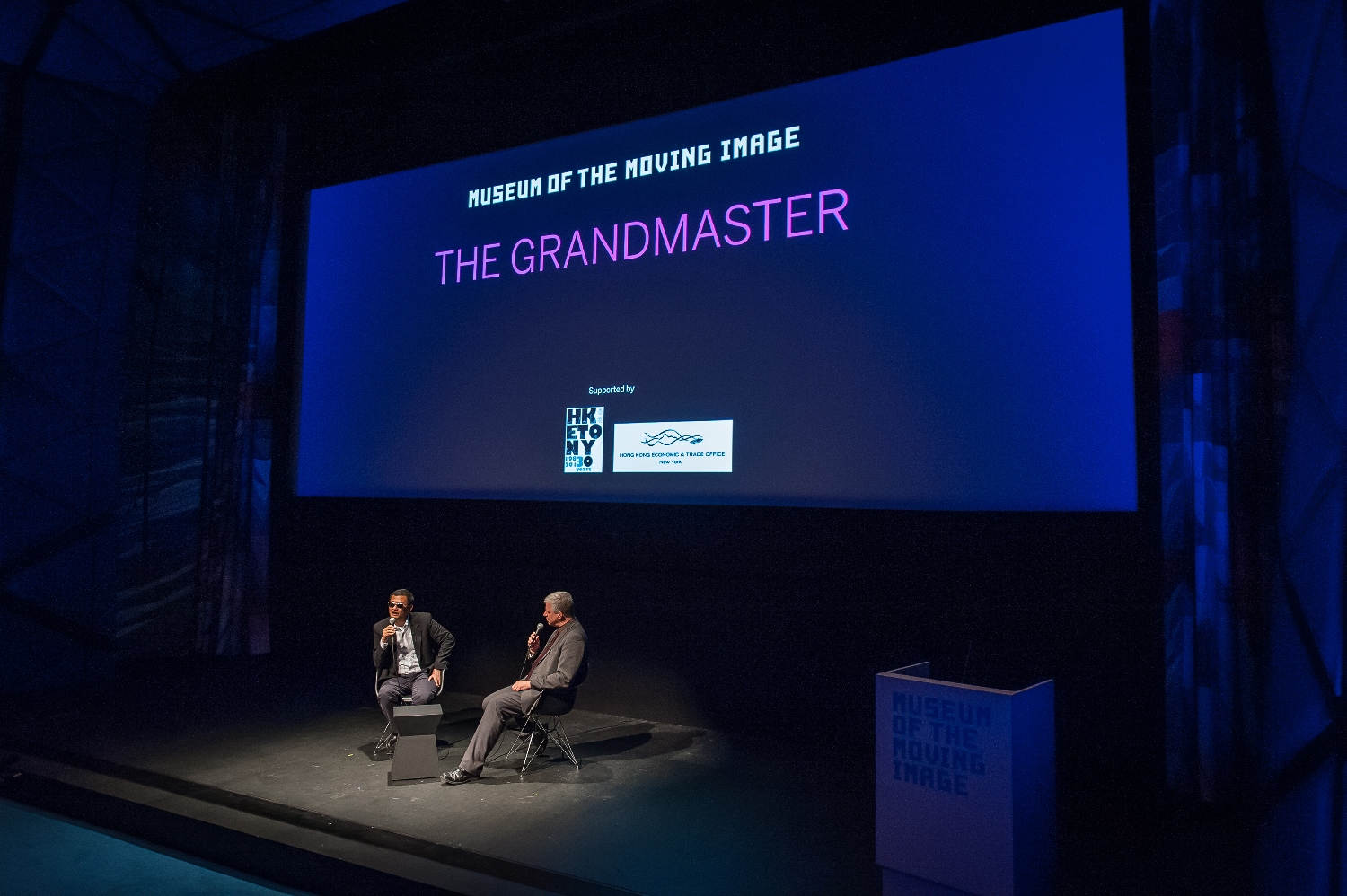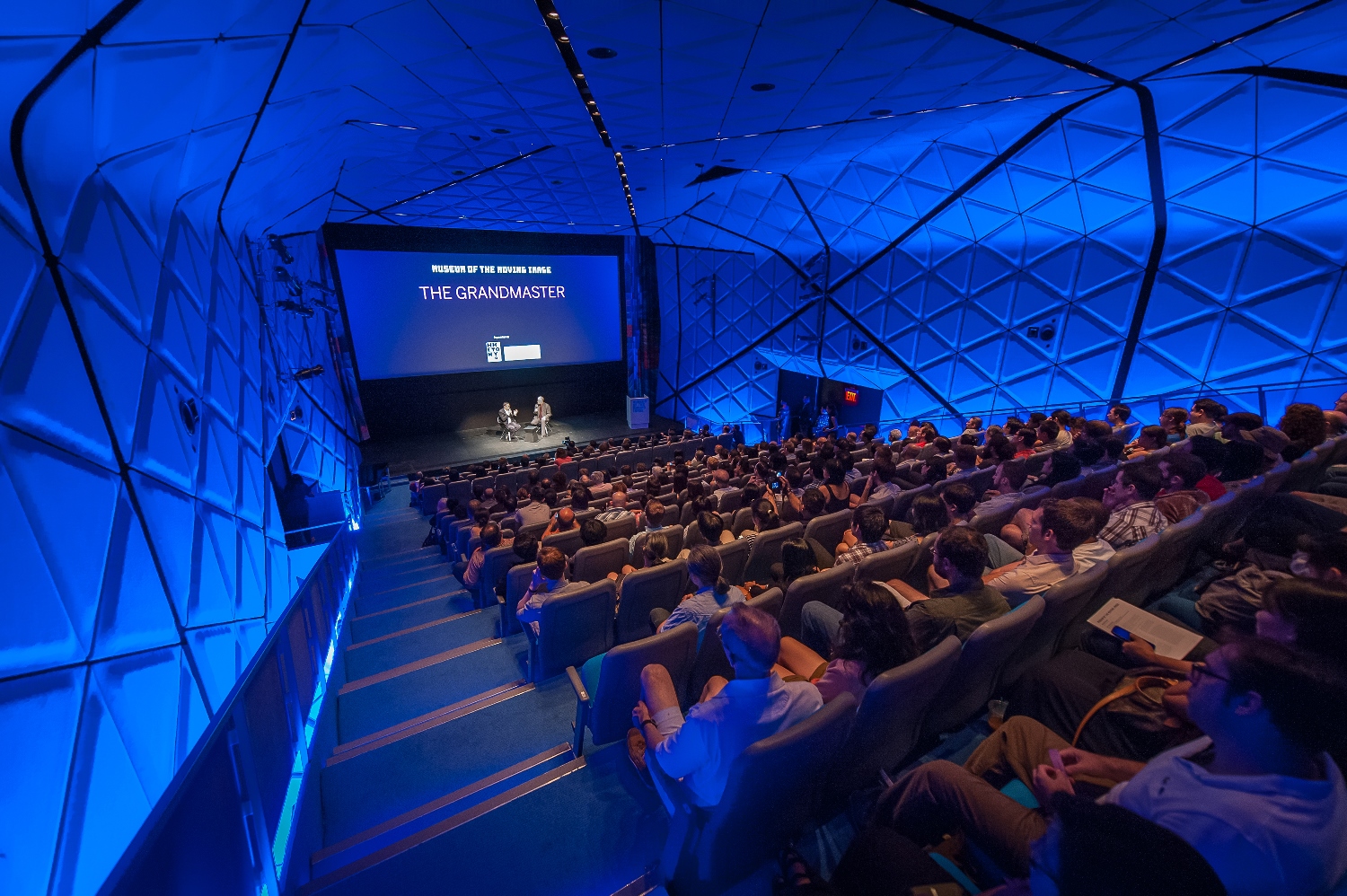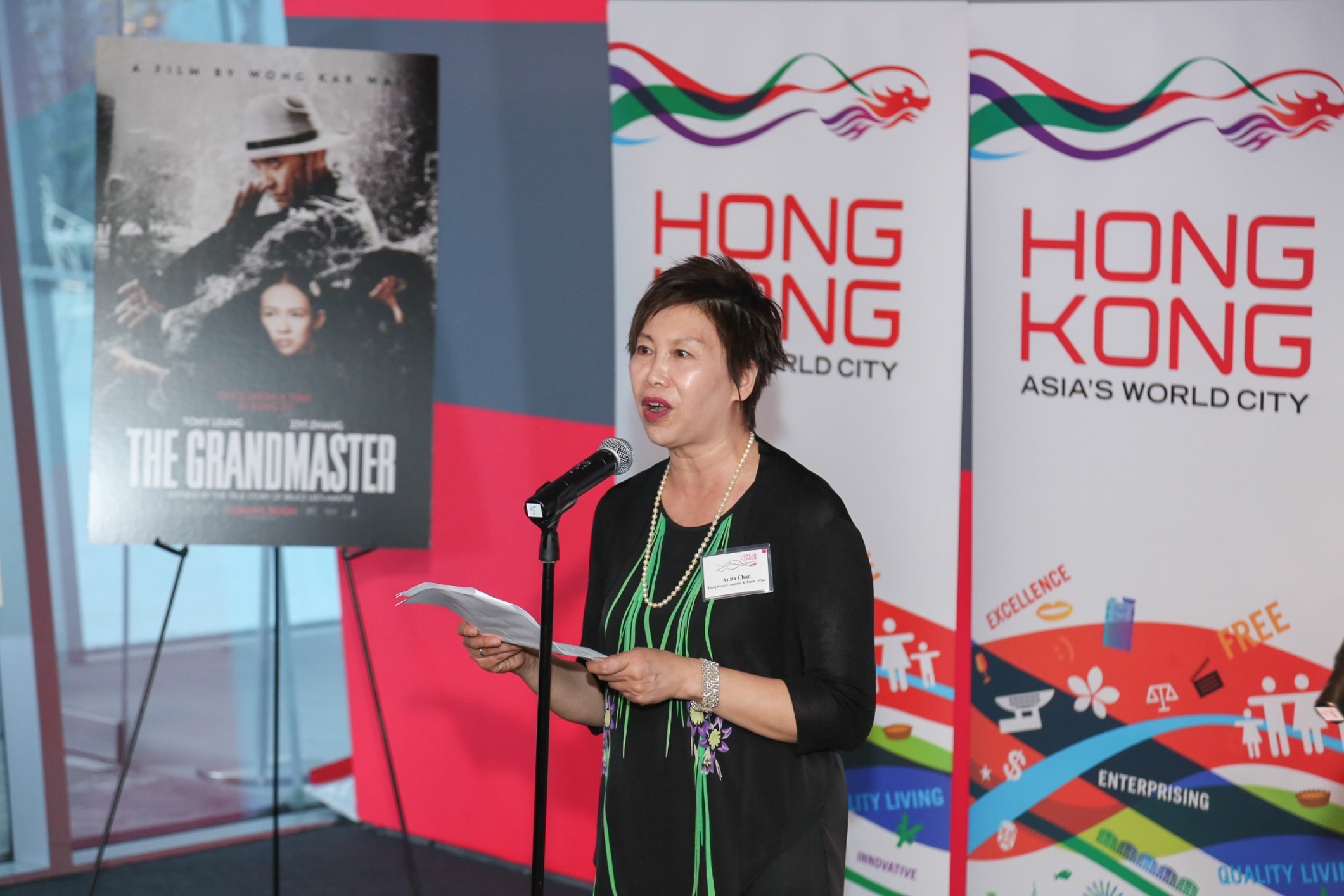By William Kustiono & Yvonne Lo
Photo credit: The Museum of Moving Image
On August 11, The Museum of Moving Image welcomed Hong Kong movie director Wong Kar-wai to a discussion of his latest work, The Grandmaster. The Grandmaster chronicles the life of the Wing Chun grandmaster Ip Man, the man who trained Bruce Lee, from the 1930s in Foshan, his flight to Hong Kong after the Second Sino-Japanese War, and the events leadings to his death. The movie stars Tony Leung Chiu Wai as Ip Man and other notable actors such as Zhang Ziyi, Chang Chen, and Zhao Benshan. Special guest appearances include the famous martial arts choreographer Yuen Woo-ping (of The Matrix and Crouching Tiger, Hidden Dragon fame) and MMA fighter Cung Le.
Kicking off with a lavish introductory battle between Ip Man and several foes against a dark, rainy backdrop, The Grandmaster uses its opening sequence to establish the poetry of motion that defines the Wing Chun technique. But action leads directly into a contemplative mood; the year is 1936, a time of political upheaval in which the invasion of Japanese forces to the north endanger the country’s current stability. Longtime Wing Chun master Gong Yutian (Wan Qingxiang) witnesses Ip Man’s fight and instantly recognizes a potential heir just as he contemplates retirement. Visiting Southern China’s Gold Pavilion in the city of Foshan for a commemoration of his accomplishments, Gong kicks off a tournament to formally determine his replacement.
A few years later, Ip Man encounters Gong’s equally talented daughter Gong Er (Ziyi Zhang), the only Wing Chun practitioner fully schooled in her dad’s revered “64-hand” method. While the bonds between these surefooted fighters grow, so does the bigger tension of the pre-war backdrop, which eventually overwhelms everything else. When the Japanese occupation brings a faster end to Gong Er’s career than anyone around him expected, his daughter launches on a warpath against defected Gong disciple Ma Shan (Zhang Jin) who killed her father, while Ip Man’s own ambitions are buried in a hail of wartime tragedies. His family descends into poverty and he loses his two daughters due to starvation.
Ip Man moves to Hong Kong in the hope of starting a career as a martial arts teacher, but ends up facing all sorts of challenges because there were also numerous other martial arts masters. He defeats them soundly and earns a reputation. He meets Gong Er again on Chinese New Year’s Eve 1950 and we discover her confrontation between Gong Er and Ma San at a train station on Chinese New Year’s Eve 1940. Gong defeats Ma after a brutal and intense fight. However, Gong herself is heavily injured and loses her ability to use martial art.
The film then fast-forwards to the 1952, when Ip Man and Gong Er meet each other for the last time. Gong confesses to Ip that she has had romantic feelings for him since they met. Suddenly, we see her collapse to the floor. The cause of death was never clearly stated, but it was implied that in the fight with Ma San not only her martial art was lost, but her life was shortened, too. The final scenes offer a visual montage as Ip Man’s school flourishes. Off screen, it is states that Ip Man died in 1972.
Director Wong Kar-wai described his film making as “grueling a shot’. He worked on this project for 22 months, almost 2 years. He remembered in the first scene, the action scene for Tony, it took a month to produce it. He told the audience the reason he needed to move the shoot to the North during June rehearsal was because Tony broke his arm. The shot was in the train station far away in Shenyang and every night it was minus 20 degree Celsius. After the winter passed, Tony recovered from his broken arm and continued to shoot in the south. When we reached south China, it was unbelievably hot.
Hong Kong actor and the winner of Cannes Film Festival, Tony Leung Chiu-Wai stars in The Grandmaster as Ip Man. Tony has collaborated with Wong Kar-Wai for seven films, and three of them had been officially selected as competition film in Cannes Film Festival, including Happy Together (1997), In the Mood for Love(2000), and 2046 (2004). He also starred in several international films including A City of Sadness (1989), Cyclo (1995), Hero, and Lust, Caution (2007).
When filming the fight scenes for The Grandmaster, Tony kept getting injured. He does not have a background in martial art background and only started to practice at age 47. Wong told Tony that he required protection when sparring with MMA fighter Cung Le. The pads were hard as a rock, but it would ensure Tony’s safety during the shoot. But, Tony was far too careless and carefree and did not put the safety wear on and injured himself.
In the historical transition, Yip Man is not a typical martial artist. He was brought to be a businessman while growing up from a rich family. He was born during the monarchy in China. He lived through Chinese history since the early days of Republic of China. When Wong compared himself to Yip Man, he knew he was different from him. Wong grew up on the street filled with martial artists, but he was not allowed to join or practice because some were associated with the triads. But that didn’t keep Wong away, he was really curious about the ideology behind martial arts.
Wong got the idea for the movie when he was shooting Happy Together in Argentina. At the train station in Buenos Aires, he saw a magazine with Bruce Lee on the front page. He recalled Bruce Lee’s influencer is Ip Man. When Wong went to Hong Kong, he had the chance to meet with Yip Man’s family. They showed him a secret documentary video about Ip Man. In this short documentary, the grandmaster is in his 70s and he shows a demonstration of Wing Chun. People offer him money and ask him to perform for them, but he refuses. He only wants to perform for his students. Wong described the video as emotional, especially when the grandmaster suddenly stops in the middle of his demonstration and leans on a dummy. It would be because he was either tired or forgot the combinations. Grandmaster Ip shared his thoughts on how he wanted to pass the technique onto future generations. He wanted to preserve the technique so future generations could practice Wing Chun. He had an ambition to create a Kung Fu movie, a movie different than the others because he found other Kung Fu movies to be filled with revenge or vengeance. He wanted a film that would preserve the technique for future generations, to keep the light on, and continue the practice. Wong quoted him that in order to become a grandmaster; you need to have the vision, generosity to share the skill to the future generation.
Wong created the movie in two different parts because to be an international film it had to be no more than 120 minutes. The Chinese release has more than 120 minutes. Wong does not want to cut the film, so he purposely created two films versions for the audience to enjoy.






Leave a Reply